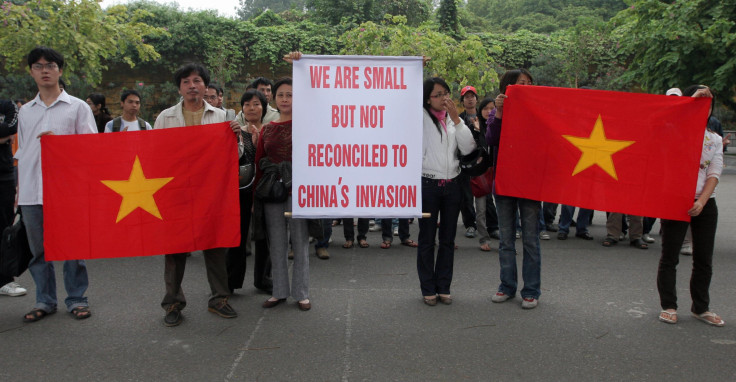Vietnam Fights 9-Dash Line, Importers Told To Reject Goods Displaying China's Claim

Life just got a bit more difficult in Vietnam for importers of Chinese goods. The Ministry of Industry and Trade, in an online statement, said companies must review contracts and improve their monitoring of imported goods.
Even more onerous, importers of “high risk” items like maps, publications and gadgets, must ask sellers for a “written commitment” that none of the products violate Vietnam’s sovereignty.
So, what is the fuss all about? The answer is China’s encroachment into the waters of countries that have exclusive economic zones has been a constant irritant since the EEZs were established. Because smaller countries like Vietnam, Indonesia, and the Philippines cannot risk a military confrontation with China, they often resort to other ploys to push back.
Vietnam’s location just south of the giant superpower makes it a prime target for the Chinese to deploy survey ships, warships and even portable oil rigs into the region. In October, a Chinese oil survey vessel finally left Vietnamese-controlled waters after more than three months of operation without the proper authorization.
The biggest symbol of the dispute is the Nine-Dash Line, an artificial “border” that China uses to declare its sovereignty over the bulk of the South China Sea. The line crosses into the EEZs that extend some distance out from the shores of Vietnam and other countries.
The idea may have stemmed from an October decision by Vietnam to stop showing the kid’s movie “Abominable” because it showed the Nine-Dash Line in the background of some animated scenes in the movie.
The same image has been seen in other products like vehicle navigation devices and solar power inverter software. Any device that uses a map would be considered a likely place for the image to be displayed. Companies will be required to report any suspected violation to provincial authorities.
Early in November, Vietnam said Volkswagen AG’s local distributor and a car importer would be fined over a navigation app reflecting China’s Nine-Dash Line claims.
It is not known how effective this measure will be to “control” China’s behavior, but the stakes are high. The United States has estimated that the oil and gas reserves within the Nine-Dash Line could be worth $2.5 trillion.
Vietnam shares its northern land border with southern China, so it is vulnerable to encroachment there as well. Forty years ago, they fought a brief war along the border.
© Copyright IBTimes 2024. All rights reserved.





















